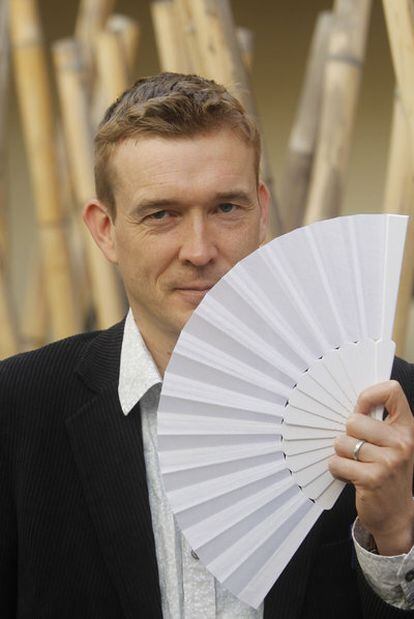He says he has always envied musicians.
She believes that it is something that often happens, that writers envy musicians because they have the opportunity to share their work.
Observing the reaction of the public at the very moment in which they produce a piece.
“The writer has to wait.
Days, weeks, months, years.
And it's never the same.
Because nobody sees you when you are and you are not at the same time.
But you can see them.
When Nina Simone performed a song on the piano, she was there and at the same time she was in that other place where she is when she creates.
And that's magic,” he says.
And yet, David Mitchell (Southport, United Kingdom, 53 years old), the guy who writes because he read Ursula K. Le Guin and wanted to be in more than one place at the same time, the author of abysmal and dreamlike artifacts like
The cloud atlas
or
Bone Clocks
, Lana Wachowski's best friend –and screenwriter for her and her sister on
Sense 8
and the latest
Matrix–
, never had a band.
He didn't even learn to play an instrument.
"I did when I started writing
Utopia Avenue
," she confesses.
She is at her house in Arnfield, Ireland.
It is early in the morning.
He has an hour before he starts his pilates class.
"There are two types of writers," he says about it.
"Those who have back pain and those of us who go to pilates classes."
When he laughs his almost disappear.
He takes a sip of his coffee.
When picking up the video call, he brought the cup closer to the camera and pretended to toast with it.
His aforementioned Utopia Avenue
has just been published in Spain
(Random House Literature), the story of a gang that didn't exist but might have because, back then, London, late '60s, gangs were everywhere, and humanity was scrambling, trying to build something new, and destroy what was then.
“Today it is as if the bands were in the second division, or in the third regional division, which does not mean anything at all.
Music is still there, and how it allows us to connect with ourselves remains a mystery.
The desire to create will never end,” he says.
In fact, the novel, no matter how inventory it may be –to those who love the musical genre in fiction, who are more of
High Fidelity
and
Almost Famous
that
Juliet, Naked
or
A Star Is Born
is going to give them back a lost world– the way a band is set up and how that band achieves success, which it intends to do is shed some light on what it consists of the art.
Or how it explodes and organizes itself to make sense, how it transforms into something capable of changing the world and anyone who inhabits it.
Without forgetting to take a look at the dangers of success that, in music, are infinitely more ferocious.
Mitchell, who moved to Hiroshima to teach English in 1994 – the same year that David Peace, another titan of British letters, moved to Tokyo to do the same – found that kind of success a decade later. later, when he published
The Cloud Atlas
.
She was then 35 years old.
“The difference for a writer, at least for me, is that all you have to do is open any book by Alice Munro, Chekhov, Kevin Barry or George Saunders, and it will go away.
The true enemy of every artist is the ego.
The ego can kill you.
You have to learn to control it.
I think for a writer it's easier, or should be.
After all, we did not go out, as Freddie Mercury did, on stage before a stadium where tens of thousands of people chant your name, ”he argues.
Not even signing the script for
Matrix Resurrections
comes close.
"The writer starts from scratch with each project, and that saves you," he adds.
British writer David Mitchell in Madrid in 2019. BERNARDO PÉREZ
It starts from scratch, and at the same time it doesn't.
At least, in his case.
Each David Mitchell novel is connected to the rest in a way that goes unnoticed by the reader of only one but that intrigues, greatly, the reader of all of them.
"My novels are forming a kind of
Transformer
," he says.
The characters intersect, and sometimes they are everywhere, like Dr. Marinus, to whom the writer will give the leading role in one of his next novels.
"It's the third.
My novels wait, they queue.
I have them all here,” he says, pointing to his head.
And something that happens in all of them is that they erase the border between the real and the unreal –sometimes, as in
Utopia Avenue,
in an epidermal but equally dark way–, and they are guided by their characters, complete universes that allow the reader to disappear while reading.
“It is something that happens to me while I write.
That I disappear, ”he says too.
Elf, Dean, Griff, Jasper, the members of the band, and also Levon, their manager, could star in their own novel, and in fact, they do, because Mitchell's mind works like a hive when he creates.
And diversity matters a lot.
Also neurodiversity.
The reason Mitchell lives on a farm in the middle of some kind of nowhere in Ireland has to do with something that is finally starting to show up in his novels, and not the way he usually does, but the way he should, he says.
His son Nic, 15, has severe, non-verbal autism.
He perceives the world in a way "that we can't even imagine," he says.
In the novel, Jasper De Zoet, while apparently like the rest, is not really.
He perceives the world as his child might be, and the reader notes how far removed from it all he can feel.
"It's not a plot element,
Along with his wife, Keiko, Mitchell translated Naoki Higashida's book
The
Reason I Jump
into English
.
Roca Editorial), the first-person story of a boy with the same severe autism as his son who has never, like him, been able to speak but who communicates with his teacher with a series of symbols that have allowed him to write stories to to tell what it is like to be in a body "in which the director of thoughts, senses and recognition of emotions has disappeared", as Mitchell himself recounts in the introduction.
“Discovering that the same desire to create could exist in my son, and that I had a way to do so, gave me hope.
Sometimes I think that he has some kind of super power, and that he is teaching us things all the time.
He is a sage.
But his wisdom is painful wisdom because he pays a very high price for it,” he says.
That Stephen King – who was in a band, but one that he set up with other writers when he was already a writer – was enthusiastic about
Utopia Avenue
is not something that particularly excites him, because he was never a great reader of his novels, although he considers it "An honour, of course."
“I guess at the time I should have been reading
It
, I'd rather go to another century.
As a teenager I read 19th century novels,” he says.
His obsession with time and with the possibility of altering it is a constant in his work.
That's why she loves to think that one of his novels,
From Me Flows What You Call Time
, is time traveling as part of the Oslo Future Library project.
The novel will be published in 2114, along with the hundred other novels that will have been collected, one per year, until then.
“What more can I ask for?
I'm a lucky guy”, she sentences, she laughs and her eyes narrow.
You can follow ICON on
,
,
, or subscribe to the
Newsletter here
.




/cloudfront-eu-central-1.images.arcpublishing.com/prisa/44EDHP4AVBFKXNYRQGFCZUX7LQ.jpeg)








